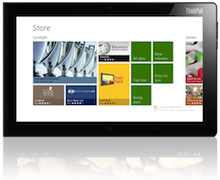Intel targeting both enterprise, Generation Y with Windows 8 tablets


SAN FRANCISCO -- While the Wintel partnership might have seemed in jeopardy earlier this week, Intel continued to reiterate its support for Microsoft and the impending Windows 8 launch with a showcase of its partner-developed tablets at a media presentation on Thursday.
See also on CNET: Intel and partners may be late to the tablet party, but they're here
The overall gist of Intel's Windows 8-based lineup appears to be that these tablets can do it all, and that there is an Intel-based tablet for all customers out there.
With a wide partner ecosystem consisting of Dell, Acer, Asus, Hewlett-Packard, LG, Samsung, and ZTE, among others, it certainly is possible that Intel has covered all of its bases.
But that might seem overly broad (and even confusing) to customers when compared the approach by partner Dell, which recently introduced a handful of Windows 8-devices (based on Intel architectures) with a more fine-tuned strategy to meet BYOD challenges.
On the one hand, Intel looks like it is trying to target the enterprise with certain tablets. Along with unveiling the new Intel Atom Z2760 dual-core processor, Intel highlighted how some of its tablets are being used within businesses for everything from tracking sales forecasts to enabling doctors to be able to read medical charts while on-the-go.
But the chip maker also looks like it is trying to update its brand by talking more directly to Generation Y.
Intel made this most evident by kicking off Thursday's presentation with a talk from Lauren Berger, author of All Work, No Pay as well as founder and CEO of her own startup, InternQueen.com.
Self-described as a Generation Y expert on personal and professional networking and career development, Berger explained how she uses her tablet throughout the day, emphasizing just how important it is not just to her work, but all facets of her life.
"Technology isn't how I run my day. It is my day," Berger remarked. For example, when scrolling between fashion and political news, Berger said that she tweets anything she finds interesting to her followers so she "can be constantly adding value to their lives" as well as her own.
Berger admitted that Millennials are usually quite "fickle" and "hard to pin down." She posited that as a Millennial, she typically says she wants "everything," describing this to mean she wants to "go everywhere" and meet as many people as possible. Berger continued that the only way to do that is through technology.
"Technology allows us to be accessible to everything," Berger concluded. "We are the everything generation."
Essentially, that is exactly what Intel and its partner ecosystem needs to understand. The challenge is to predict what this demographic wants next.
It's arguable that Apple has already addressed this with the iPad, but we'll find out Intel and its partners did that too or not with the roll out of these new Windows 8-based tablets.
Wintel in jeopardy?
Erik Reid, general manager of the Apps Processor Division within the Intel Mobile and Communications Group, did briefly address the kerfuffle earlier this week in which it was speculated whether or not Intel CEO Paul Otellini told employees that Windows 8 wasn't ready for launch.
Reid tried to do some more damage control on Thursday, defending Otellini's comments by telling the media present that Intel has worked for years with "hundreds and hundreds of engineers at Microsoft" to make Windows 8 devices happen.
He added, "We could not be more excited about Windows 8 and what it brings to the market."
Images via Intel